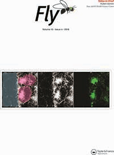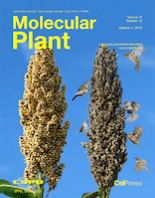
FLY
Scope & Guideline
Innovating Research in Insect Ecology and Management
Introduction
Aims and Scopes
- Genetic and Molecular Biology:
Research that explores genetic mutations, gene expression, and molecular pathways in Drosophila, contributing to our understanding of fundamental biological processes. - Neurobiology and Behavior:
Studies investigating the neuronal mechanisms underlying behavior, neurodegeneration, and the impact of genetic and environmental factors on nervous system function. - Developmental Biology:
Research focusing on the developmental processes in Drosophila, examining how genetic and environmental factors influence growth and differentiation. - Ecology and Evolutionary Biology:
Investigations into the ecological interactions and evolutionary adaptations of Drosophila species, providing insights into speciation and environmental resilience. - Technological Innovations:
The journal emphasizes the development and application of novel methodologies and technologies, such as genetic tools, imaging techniques, and computational models, to advance research in Drosophila.
Trending and Emerging
- Neurodegeneration and Aging:
There is an increasing focus on using Drosophila as a model to study neurodegenerative diseases and aging, highlighting the relevance of genetic factors in these processes. - RNA Editing and Gene Regulation:
Research into RNA editing mechanisms and their implications for gene regulation is gaining traction, underscoring the complexity of post-transcriptional modifications in Drosophila. - Functional Genomics and High-Throughput Techniques:
The application of high-throughput genomic techniques, such as ATAC-seq and CUT&RUN, is on the rise, reflecting a trend towards comprehensive analyses of gene function and regulation. - Inter-organ Communication and Hormonal Regulation:
Studies exploring how different organs communicate and the role of hormones in regulating development and behavior are increasingly prominent, emphasizing the integrative biology of Drosophila. - Cellular Mechanisms of Development and Plasticity:
Research into cellular dynamics, plasticity, and tissue development is emerging, indicating a growing interest in the cellular basis of morphology and function in Drosophila.
Declining or Waning
- Ecological Studies:
Research on Drosophila's ecological roles and interactions has decreased, possibly due to a shift towards more molecular and genetic studies in recent publications. - Basic Physiology:
Publications focusing solely on foundational aspects of Drosophila physiology without a direct link to genetic or ecological implications have become less frequent. - Historical Taxonomy:
Studies devoted to the taxonomic classification and historical biogeography of Drosophila species are less prevalent, indicating a waning interest in traditional taxonomy in favor of functional and applied research.
Similar Journals

EVOLUTION & DEVELOPMENT
Unlocking the Secrets of Life's Evolutionary Pathways.EVOLUTION & DEVELOPMENT is a prestigious academic journal published by WILEY, focusing on the intricate interplay between evolutionary and developmental processes. With an ISSN of 1520-541X and an E-ISSN of 1525-142X, this journal has established itself as a leading source of scholarly articles since its inception in 1999. It enjoys a Q2 ranking in Developmental Biology and a remarkable Q1 ranking in Ecology, Evolution, Behavior and Systematics, positioning it among the top-tier journals in these fields, as evidenced by its Scopus rankings, notably the 26th percentile in Developmental Biology. Researchers and practitioners benefit from high-quality peer-reviewed articles that push the boundaries of knowledge and foster interdisciplinary collaboration. While open access options are not currently available, the journal's robust visibility and impact factor underscore its importance in advancing understanding within the biological sciences. The editorial objective of EVOLUTION & DEVELOPMENT is to bridge the gap between evolution and development, integrating findings that elucidate the paths of organismal change. The journal is a must-read for anyone dedicated to exploring the complexities of life sciences, making it an invaluable resource for researchers, professionals, and students alike.

MOLECULAR REPRODUCTION AND DEVELOPMENT
Connecting researchers to advance the science of reproduction.MOLECULAR REPRODUCTION AND DEVELOPMENT is a prestigious peer-reviewed journal published by WILEY, specializing in the intricate domains of Cell Biology, Developmental Biology, and Genetics. Since its inception in 1988, this journal has been a vital platform for disseminating pioneering research and innovative methodologies that advance our understanding of molecular mechanisms driving reproduction and development. With a current impact factor reflective of its significance in the field, MOLECULAR REPRODUCTION AND DEVELOPMENT is ranked Q3 in both Cell Biology and Developmental Biology, and Q2 in Genetics, underscoring its relevance and scholarly contribution. Catering to a diverse audience of researchers, professionals, and students, this journal not only showcases cutting-edge findings but also aims to foster interdisciplinary exchanges that enhance scientific collaboration. By exploring critical biological processes, it ultimately contributes to the broader understanding of health and disease in various organisms, making it an essential resource for anyone dedicated to the life sciences.

Molecular Plant
Pioneering discoveries at the intersection of biology and agriculture.Molecular Plant, published by CELL PRESS, is a premier journal dedicated to advancing the field of molecular biology and plant science. With an impressive impact factor reflecting its rigorous peer-review process and the high quality of its published research, this journal has achieved a remarkable Q1 ranking in both Molecular Biology and Plant Science categories as of 2023. Its Scopus rankings place it within the top echelons of its field, holding 2nd place in Agricultural and Biological Sciences - Plant Science, showcasing its vital role in disseminating impactful research. The journal covers a broad range of topics, including but not limited to, plant genetics, molecular interactions, and biotechnological advances. Research published in Molecular Plant has the potential to significantly influence agricultural practices and biotechnological applications, making it an essential resource for researchers, professionals, and students eager to stay at the forefront of plant research. Access options for the journal are tailored to accommodate a wide audience, facilitating engagement with cutting-edge findings and breakthroughs. As the field of plant science continues to evolve, Molecular Plant remains integral to fostering innovation and collaboration within the scientific community.

MOLECULAR GENETICS AND GENOMICS
Championing Cutting-Edge Discoveries in GeneticsMOLECULAR GENETICS AND GENOMICS is a distinguished journal published by SPRINGER HEIDELBERG that serves as a pivotal platform for the communication of cutting-edge research and developments in the fields of genetics, molecular biology, and medicine. With an ISSN of 1617-4615 and an E-ISSN of 1617-4623, this journal has established itself since its inception in 1994 as a significant resource for researchers aiming to explore the complexities of genetic interactions and their implications in various biological systems. The journal is indexed in Scopus, with respectable rankings in the Genetics, Molecular Biology, and Biochemistry categories, showcasing its position within the academic community. It is categorized in the 2023 rankings as Q3 in Genetics, Q2 in Medicine (miscellaneous), and Q3 in Molecular Biology, indicating its relevance and quality in the scientific discourse. The journal also promotes open access, ensuring that researchers and professionals can easily share and advance knowledge in the rapidly evolving disciplines of molecular genetics and genomics. As the journal continues to bridge the gap between experimental and theoretical research, it presents a vital space for innovation, fostering collaborations and scholarly exchange among its readership.

Cold Spring Harbor Perspectives in Biology
Synthesis of Ideas, Pioneering Biological ResearchCold Spring Harbor Perspectives in Biology is a prestigious academic journal published by COLD SPRING HARBOR LAB PRESS that serves as a vital resource in the fields of Biochemistry, Genetics, and Molecular Biology. With an impressive impact factor and categorized in the Q1 quartile for its contributions, this journal is renowned for curating comprehensive reviews that synthesize the latest advancements and ongoing research in these dynamic and interconnected disciplines. Since its inception in 2009, the journal has played a pivotal role in advancing scientific knowledge through high-quality articles that cater to researchers, professionals, and students alike. Although it operates on a traditional subscription model, its contributions are indispensable for those seeking to remain at the forefront of biological research and its myriad applications. With a commendable ranking of #19 out of 221 in general biochemistry, genetics, and molecular biology on Scopus, this journal ensures that its readers have access to cutting-edge insights and a rigorous academic discourse.

JOURNAL OF NEUROGENETICS
Illuminating the Genetic Pathways of Neurological HealthJOURNAL OF NEUROGENETICS, published by Taylor & Francis Ltd in the United Kingdom, is an influential platform for research and discussion in the dynamic field of neurogenetics. With an ISSN of 0167-7063 and an E-ISSN of 1563-5260, this journal has been committed to advancing our understanding of the genetic underpinnings of neurological conditions since its inception in 1983. Presently categorized in the Q3 quartile for Cellular and Molecular Neuroscience and Q2 for Genetics as of 2023, it serves as an essential resource for researchers and professionals seeking insights into the genetic factors influencing nervous system function and disorder. Although it does not offer open access, the journal remains a critical repository of knowledge with a broad scope that invites contributions spanning molecular genetics to neurobiology. With its rankings in Scopus reflecting a keen focus on robust academic standards, the JOURNAL OF NEUROGENETICS is vital for those dedicated to pioneering research and finding solutions in neurogenetics, making it a significant asset to students, scholars, and industry experts alike.

Open Biology
Unlocking the mysteries of biology, one study at a time.Open Biology is a prestigious, interdisciplinary journal published by the Royal Society that has been paving the way in the fields of Biochemistry, Genetics and Molecular Biology, Immunology, and Neuroscience since its inception in 2011. Catering to a global audience of researchers, professionals, and students, Open Biology operates under an open access model, facilitating the unrestricted dissemination of high-quality research findings. With a current impact factor that positions its categories in the top quartile (Q1) and impressive Scopus rankings—evidencing its influence and reach—this journal serves as a vital platform for innovators and scientific inquiries aimed at advancing our understanding of life sciences. The journal's commitment to publishing cutting-edge research makes it an essential resource for those at the forefront of scientific exploration.

Cells & Development
Connecting Disciplines to Propel Developmental DiscoveriesCells & Development is a premier journal published by Elsevier, dedicated to advancing the field of Developmental Biology. With an ISSN of 2667-2901 and an impressive Q2 ranking in its category for 2023, the journal endeavors to provide a platform for high-quality research articles that explore cellular mechanisms, developmental processes, and molecular interactions that underpin growth and differentiation. Based in the Netherlands, Cells & Development not only emphasizes the importance of innovative experimental approaches but also encourages interdisciplinary contributions that bridge the gap between basic and applied science. As an Open Access publication, it ensures that research findings are readily accessible to a global audience, significantly enhancing visibility and impact. The journal's commitment to scholarly excellence makes it an essential resource for researchers, professionals, and students aiming to contribute to the dynamic field of developmental biology.

SEMINARS IN CELL & DEVELOPMENTAL BIOLOGY
Unveiling Cellular Mechanisms for Tomorrow's InnovationsSEMINARS IN CELL & DEVELOPMENTAL BIOLOGY is a premier journal published by Academic Press Ltd - Elsevier Science Ltd, focusing on the vital domains of cell and developmental biology. With an impact factor that reflects its rigorous contributions to the field, this journal embodies the highest standards of academic excellence, currently ranking in the Q1 quartile for both Cell Biology and Developmental Biology categories as of 2023. Researchers and practitioners will appreciate its robust Scopus ranking, placing it within the top tiers of developmental biology and cell biology, with percentile ranks of 94th and 90th respectively, showcasing the journal's influential presence in the scientific community. The journal aims to disseminate comprehensive reviews, cutting-edge research articles, and significant advances in the understanding of cellular mechanisms and developmental processes, thereby catering to a diverse audience that includes researchers, scholars, and students dedicated to the life sciences. Given its commitment to open access, SEMINARS IN CELL & DEVELOPMENTAL BIOLOGY promotes widespread dissemination of knowledge, enhancing collaborative research efforts and driving innovation across biological disciplines.

GENETICS AND MOLECULAR RESEARCH
Innovating Insights in Genetics and Molecular ResearchGENETICS AND MOLECULAR RESEARCH is a distinguished academic journal published by FUNPEC-EDITORA, focusing on the rapidly evolving fields of genetics and molecular biology. Since its inception in 2002, the journal has provided a platform for high-quality research and advancements that contribute to our understanding of genetic mechanisms and molecular interactions. With an impressive convergence period extending through 2024, this open-access journal presents vital insights while maintaining accessibility for researchers, professionals, and students alike. Though currently positioned in the Q4 quartile in Genetics, Medicine (Miscellaneous), and Molecular Biology as per the latest 2023 rankings, its persistent publication efforts aim to elevate its influence within the academic community. Researchers are invited to explore groundbreaking studies that may inform future developments in these critical scientific domains.